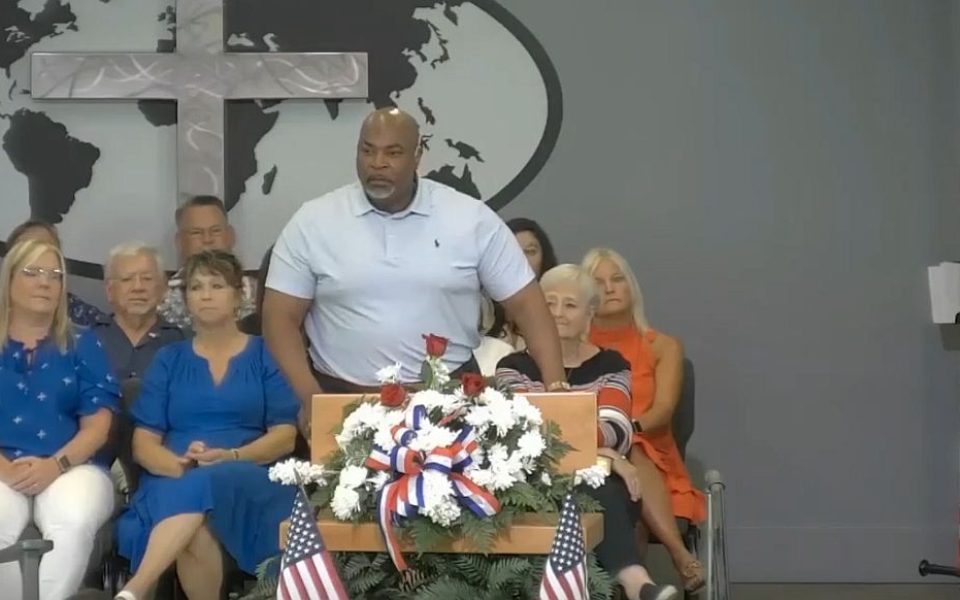Featured photo: Lt. Governor Mark Robinson speaks at The Lake Church in Bladen County. (Photo: Screengrab from Lake Church/ Facebook Page)
This story was first published by Rob Schofield, NC Newsline
As first reported by The New Republic, North Carolina Lt. Gov. and Republican gubernatorial nominee Mark Robinson told a North Carolina church audience on Sunday, June 30 that “some folks need killing.”
The statement came immediately after Robinson had characterized the United States’ response to Nazi and Japanese aggression during World War II and immediately prior to a reference to modern day “wicked people.”
Robinson said the following:
“We now find ourselves struggling with people who have evil intent.
You know, there was a time in which we used to meet evil on the battlefield. Guess what we did to it: we killed it! We didn’t quibble about it. We didn’t argue about it. We didn’t fight about it. We killed it!
When the Japanese bombed Pearl Harbor, what’d we do? We flew to Japan and we killed the Japanese army and navy. We didn’t even quibble about it. I didn’t start this fight. You did.
You wanted to be left alone. you should have left me alone. We didn’t argue and capitulate and talk about well, maybe we shouldn’t fight the Nazis that hard. No, they’re bad. Kill them!
Some liberal somewhere is gonna say that sounds awful. Too bad. Get mad at me if you want to.
Some folks need killing! It’s time for somebody to say it. It’s not a matter of vengeance. It’s not a matter of being mean or spiteful. It’s a matter of necessity!”
It was not completely obvious from Robinson’s remarks precisely whom he believes it is (or was) that deserves (or deserved) to be killed. Soon after the “killing” remarks, he made the following statement:
“When you have wicked people doing wicked things, torturing and murdering and raping. It’s time to call out, uh, those guys in green and go have them handled. Or those boys in blue and have them go handle it.”
Again, it was not obvious who the wicked people are that Robinson would have military and law enforcement personnel “handle.”
But in and around the remark, Robinson also made reference to “the tenets of socialism and communism,” whose adherents, he appeared to say, are wronging people like him and his supporters.
“They’re watching us. They’re listening to us. They’re tracking us. They get mad at you. They cancel you. They dox you. They kick you off social media. They come in and close down your business,” he said.
In an email to NC Newsline, Michael Lonergan, a spokesperson for Robinson’s gubernatorial campaign, adamantly denied that Robinson was referring to any present-day individuals with the remark about “killing.”
“He literally and specifically states in that portion of the speech that killing refers to the Nazis and the Imperial Japanese in WWII,” he said.
Lonergan, however, did not respond to a question about who the people with “evil intent” are that Robinson alluded to immediately prior to the “killing” comments.
In a statement, the campaign for Robinson’s Democratic opponent in the fall, Attorney General Josh Stein, said, “These comments fall into a long history of Robinson endorsing violence, including political violence.”
“Mark Robinson’s repeated and repulsively violent rhetoric fits into his pattern of spewing division and hate rather than serving North Carolina families,” said Morgan Hopkins, a spokesperson for the campaign. “We cannot have a Governor who calls for extrajudicial killings. Mark Robinson is divisive and dangerous.”
Robinson made the statement as part of speech to The Lake Church in Bladen County, which as of today, was available on Facebook. You can watch the relevant section below and the entire speech on Facebook.
Join the First Amendment Society, a membership that goes directly to funding TCB‘s newsroom.
We believe that reporting can save the world.
The TCB First Amendment Society recognizes the vital role of a free, unfettered press with a bundling of local experiences designed to build community, and unique engagements with our newsroom that will help you understand, and shape, local journalism’s critical role in uplifting the people in our cities.
All revenue goes directly into the newsroom as reporters’ salaries and freelance commissions.


Leave a Reply